|
|

 Johnson and the
Radical Republicans Johnson and the
Radical Republicans
 Reconstruction in the South Reconstruction in the South
 Black Reconstruction Black ReconstructionThe textual material on this webpage is drawn directly from my work America – The Covenant Nation © 2021, Volume One, pages 319-323. |

A Timeline of Major Events during this period
|

|
|
With Lincoln's assassination, Vice President Andrew Johnson was automatically elevated to the presidency. But he had neither the personal skills nor the political support necessary to carry the nation forward through a post-war healing process. Johnson was a Southerner (from Tennessee) with something of Northern attitudes, and as a Democrat (not a Republican, as was Lincoln) put on the presidential ticket with Lincoln in 1864 to flesh out the National Union ticket that both Lincoln and Johnson ran under. This left Johnson in the peculiar position of being on the political spectrum too moderate for many Republicans and too radical for many of his fellow Democrats. He generally believed that he understood and supported the policies that Lincoln had previously laid out as his intentions for the South, but would find it virtually impossible to carry out those policies. He had no personal political leverage that would enable him to do so. Thus despite the Constitutional powers of the presidential office, Johnson himself had no real personal political power to mobilize in his effort to follow up the Lincoln policy, a reminder that the man makes the office rather than the office makes the man.1 Johnson was opposed to slavery, but as
with many in the North, was not convinced that freed Blacks or
"freedmen" were yet capable of conducting the responsibilities of
citizenship (voting and holding office). Thus he was in no hurry to see the right to vote extended to the freedman. Rather, he turned his attention to the issue of reintegrating the Southerners back into the Union. Like Lincoln, he generally opposed the widespread retribution against Confederates called for by Northern Radicals. Thus to the Radicals, in particular Thaddeus Stevens and Charles Sumner (the latter who had finally recovered from his nearly fatal beating in 1856 by Southern Democrat Preston Brooks), Johnson seemed treasonously pro-South. The Congressional election of 1866 returned a large number of Republican Radicals, who then began to design their own Reconstruction policy (whose bills Johnson vetoed – only to have each veto overturned by a two-thirds vote in Congress). And thus it was that Johnson found himself slowly alienated from the powers that ruled Washington. Earlier that year, the split between Johnson and Congress was birthed by the 1866 Civil Rights Act affirming the legal equality of American Blacks, which was passed despite his veto (Johnson claimed that as per the Tenth Amendment, only the states had the right to determine the legal status of its citizens). And seeing a challenge to the new law coming from the South, Congress then authored the Fourteenth Amendment reaffirming the intent of the Civil Rights Act (full equality for all Americans, although exempting Indians and Confederate army veterans!). Johnson's opposition to the Fourteenth Amendment thus merely served to build the strength of the Radicals in the 1866 elections, and point to his own political demise. Eventually, in early 1868, Johnson would be formally impeached by the House of Representatives (March 2) and placed on trial by the Senate for his unconstitutional behavior,2 nearly being found guilty and thus removed from office (May 16). Only the lack of a single vote to produce the Senate's two-thirds majority necessary to convict spared him this enormous humiliation. But in any case after that, during the remaining two years in office, Johnson proved totally powerless in trying to shape events developing in the country, both North and South. 1This would be a matter that Americans in general would have a very hard time understanding, especially those who get caught up in the glory of nation-building, devoted to designing for others (and imposing, if possible) a perfect social-political system of various offices and powers drawn up on paper – as was the case of American involvement in Vietnam, Afghanistan, and Iraq. There were even strong elements of this same mentality in Wilson's taking America into World War One with the idea of freeing and redesigning many of the world's societies around Wilson's own highly idealized principles of democracy. 2Of
the eleven charges brought against him, the primary charge concerned
his removal of the Radical Republican Edwin Stanton as secretary of war
and replacement by the more moderate Ulysses S. Grant. This was in
violation of the Tenure of Office Act passed in 1867, itself a highly
questionable constitutional act that Congress enacted specifically to
end Johnson's power to remove cabinet appointments (such as in the
specific case of Stanton, where considerable friction had been
developing between Stanton and the president).
|
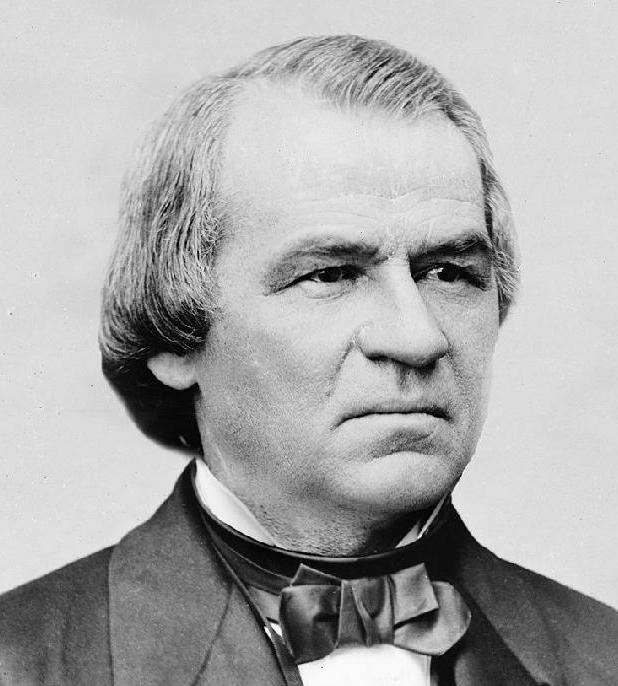
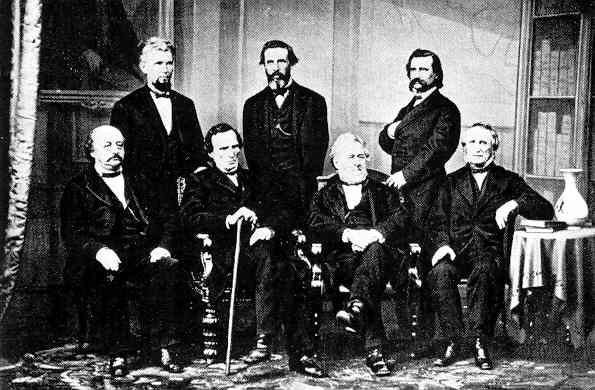
National
Archives
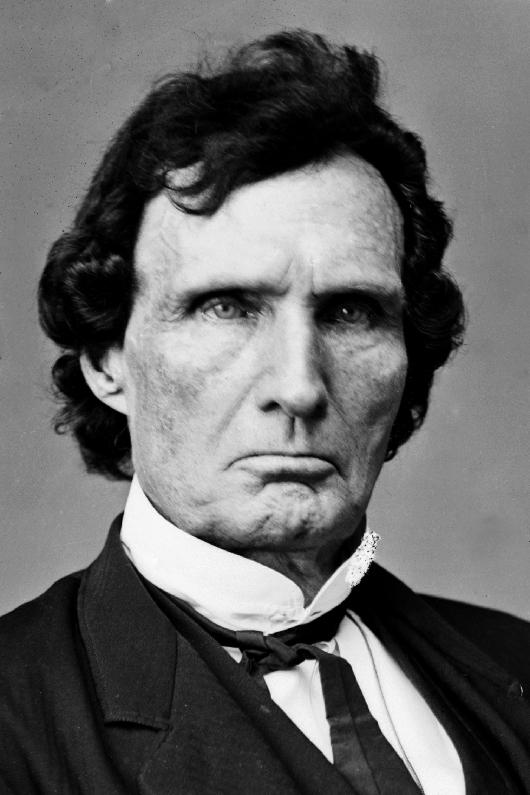
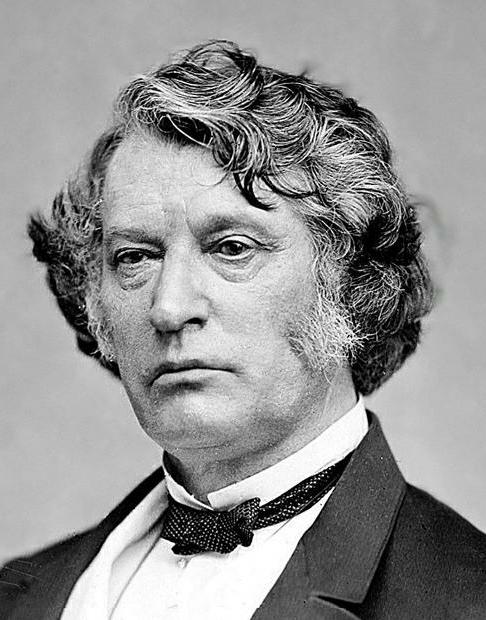

|
|
Southern Reconstruction had actually already begun before war's end, as Lincoln had placed pro-Union administrations in each of the Southern states as they came under Union control: specifically Tennessee, Arkansas and Louisiana. Slaves had technically been freed as of Lincoln's Emancipation Proclamation coming into effect on January 1, 1863, but the economic reality of what newly freed slaves might do to feed and take care of themselves had created a huge amount of confusion. Many joined the ranks of the Union army, thus fitting them into some kind of a place within the social scheme of things. That helped. But with war's end, the future of the freedman was still in doubt. Radicals talked of giving each freedman some forty acres and a mule to start out life with.3 But that idea had never been put into some kind of specific political formula before Lincoln's assassination. Anyway for most Blacks who received no title to any land, the only alternative they had was to sign on with a White plantation owner either as a tenant farmer, or as a sharecropper, where the plantation owners provided the land and the sharecroppers the labor (actually the majority of Southern sharecroppers were poor Whites). Lacking property, the Blacks soon were to discover what poor Southern Whites had long known, that they were unlikely to achieve the American dream (although in fact a small number of Blacks were ultimately able to acquire land and a settled place in the Southern scheme of things). Indeed, the situation for the Whites was often not much better than that facing the Black freedmen after the war, haggard soldiers and starving women and children scrounging through burned-out towns and farms looking for food or anything else of value. And there was the question of what to do with those who had served in the Southern rebellion as Confederate soldiers. Radicals were ready to have every Confederate officer imprisoned and many even executed. A number of Confederate families, expecting the worst – or just monumentally angry over the war's outcome – left the country, Mexico and Brazil being favored destinations. For his part, Lincoln had wanted the South reintegrated as quickly as possible, and stood adamantly opposed to the vengeance sought by the Radicals. But the South tragically had lost Lincoln's critical advocacy. Then when Johnson tried to follow Lincoln's program, but lacking Lincoln's political base, he ended up merely making his personal political standing in Washington all the worse. What Johnson decreed as the requirement
for a Southern state's readmission to the Union was a minimum of ten
percent of that state's population to pledge allegiance to the United
States. The Radicals were hotly opposed to these easy terms. Even more,
they were outraged that readmission to full status in the Union legally
exempted the Southerners from having their land seized, something the
Radicals eagerly sought as a means of redistributing Southern land to
the benefit of property-less Blacks. Nonetheless, little by little and in subtle ways, traditional Southern culture began to reassert itself. And whatever plans the Radicals had for reforming the South were to come to nothing. Black codes were passed throughout the South, forcing Blacks to contract their labor to Whites, requiring Blacks to obtain official permission to travel or move outside their counties, and imposing harsh vagrancy penalties of stiff fines or even imprisonment on any unemployed Blacks. Also, the professions and skilled trades tended to be closed to Blacks. And Blacks were forbidden to bear arms (in clear violation of the Second Amendment). Then there was the creation (1866) of the Ku Klux Klan, headed up by Confederate cavalry General Nathan Bedford Forrest, which terrorized the Blacks in order to keep them in their place. But the KKK could be just as hard on Southern Whites whom they interpreted as being too sympathetic to the Blacks, burning crosses being left prominently at strategic spots by the KKK to remind the terrorized individuals as to who and what was in charge of Southern society. 3This
idea had actually been put into action by Sherman as he swept through
the South, settling some forty-thousand freedmen on South Carolina's
Sea Islands.
|
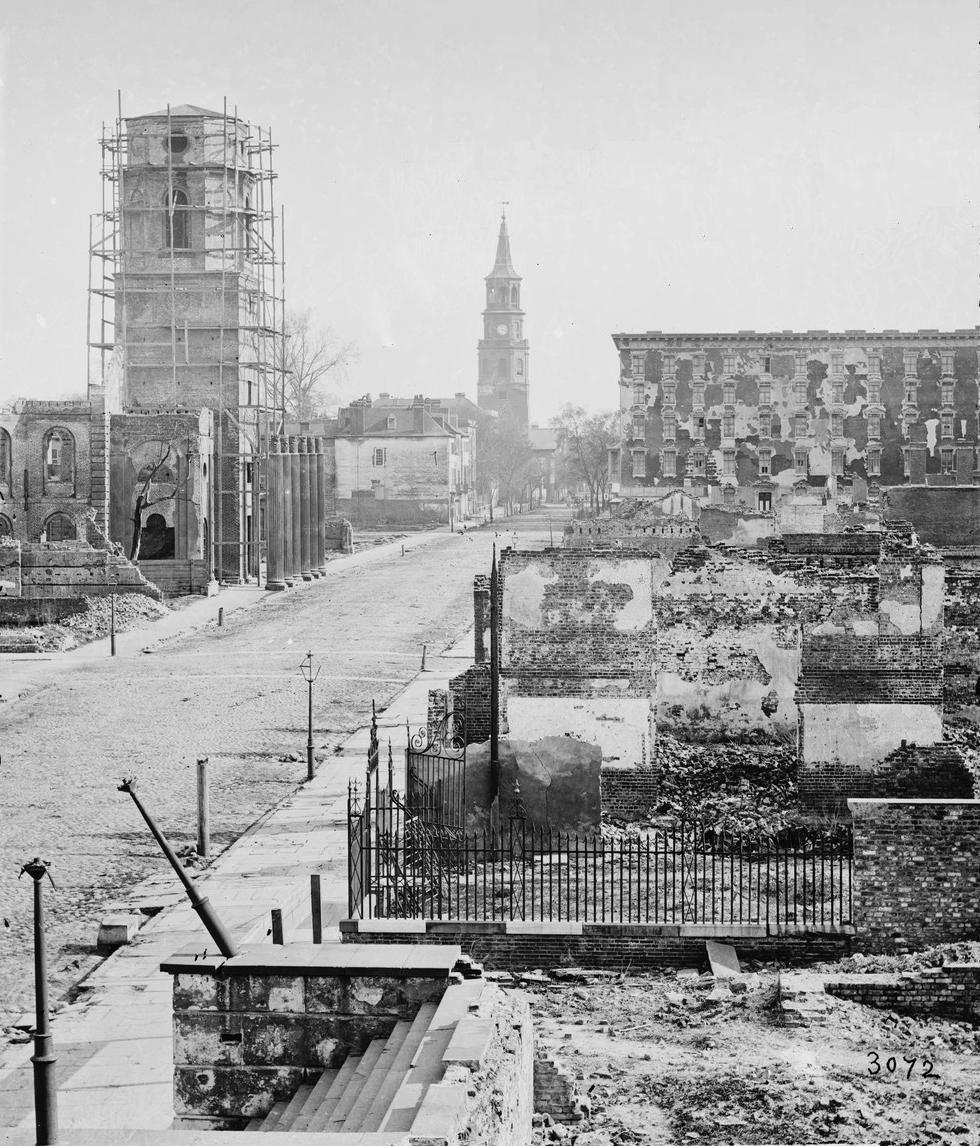
Charleston under Reconstruction

Confederate General Nathan Bedford Forrest forms the Ku Klux Klan
serving as its first Grand Wizard (1867)
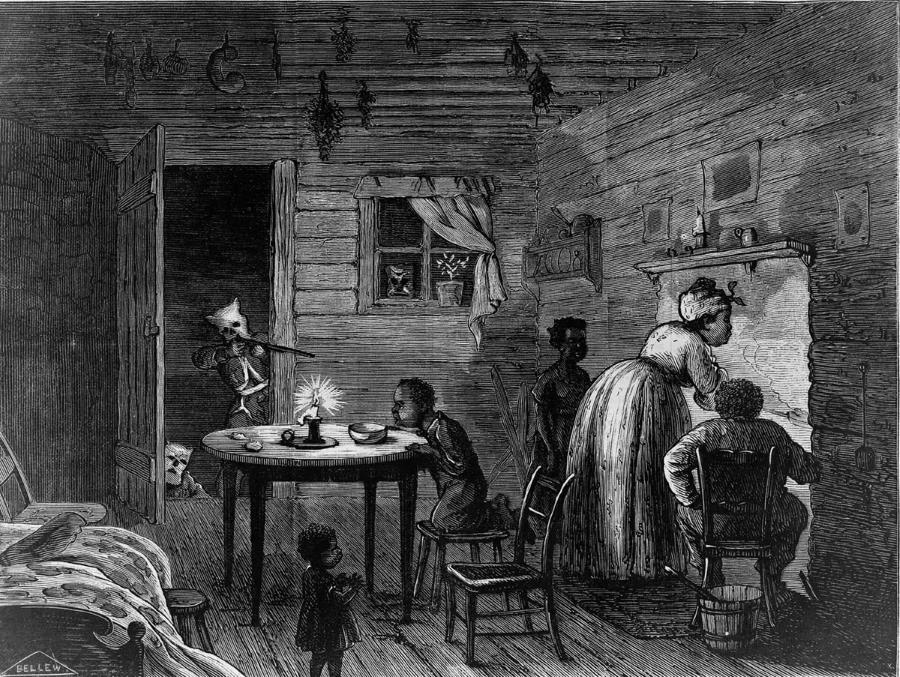
Visit of the Ku-Klux – Frank Bellew (1872)

|
|
Facing this recalcitrant Southern attitude were large numbers of Northern Whites who descended on the South, many sent by the new Freedmen's Bureau, to help the Blacks make the transition away from slavery. These "carpetbaggers"4 were disliked intensely by Southern Whites (especially the poorer Whites), but they did help bring some education to thousands of Black children (although absenteeism among Black students was very high and a serious problem in trying to bring the Black population into mainstream American culture). These reformers were backed by an 1867 Military Reconstruction Act which stripped the South of its governments set up under Johnson's liberal reconstruction policies. The new law dismissed these state governments and divided the South into five military districts commanded by Union generals and enforced by a 60,000-strong Union Army positioned throughout the South. And the terms for readmission to the Union now required not ten percent but a full majority of a state's citizens, which now included Black voters. In fact, the tendency of White voters to boycott the new elections advantaged considerably the Black vote. As a result, the South saw its first Black politicians (almost universally members of Lincoln's Republican Party) take their place in the states' assemblies, and even in the nation's Congress. None of this however served to bridge the ever-widening emotional gap between Southern Whites and Blacks. But for the time being – as long as this military administration was kept in place in the South – there was little that Southern Whites could do about a situation that they detested (including their anger directed at the North for its "imperialistic" behavior). 4Named for the type of luggage they arrived with: a large bag made of heavy cloth or carpeting.
|
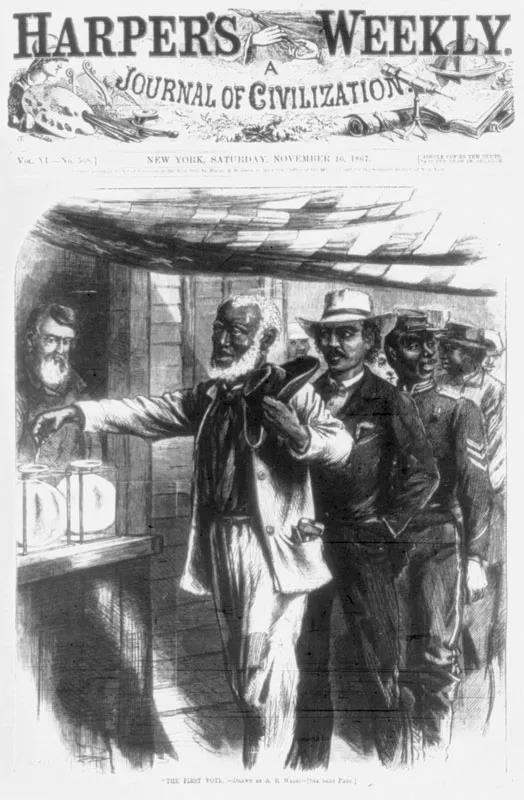
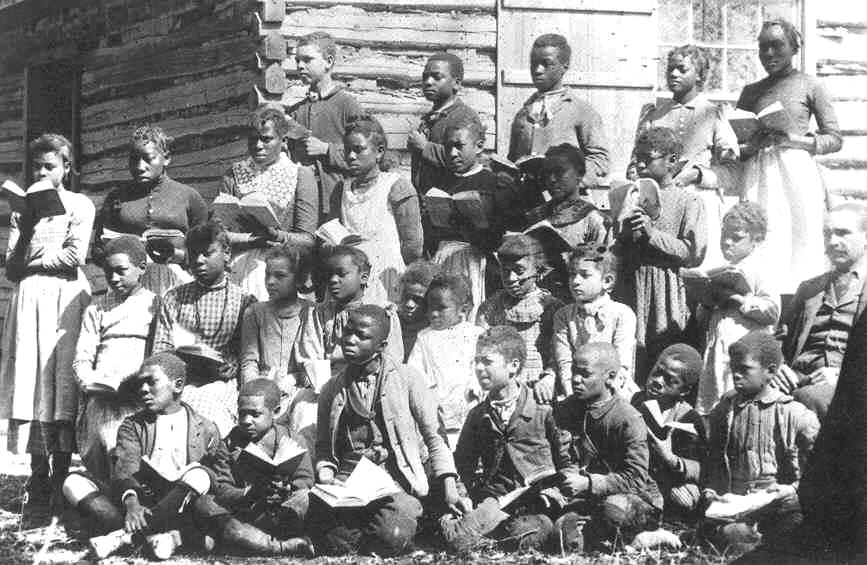
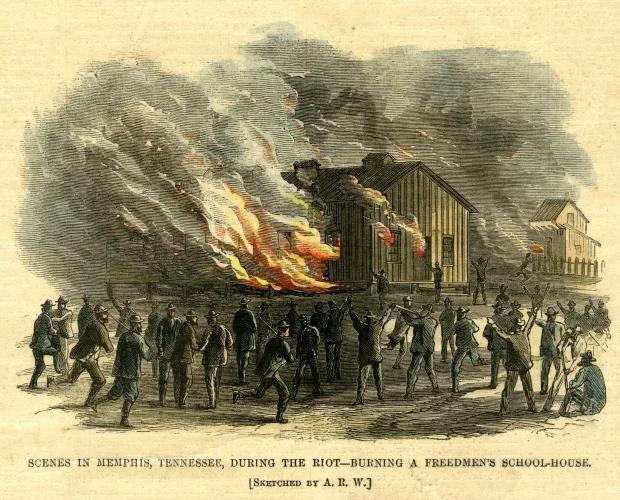
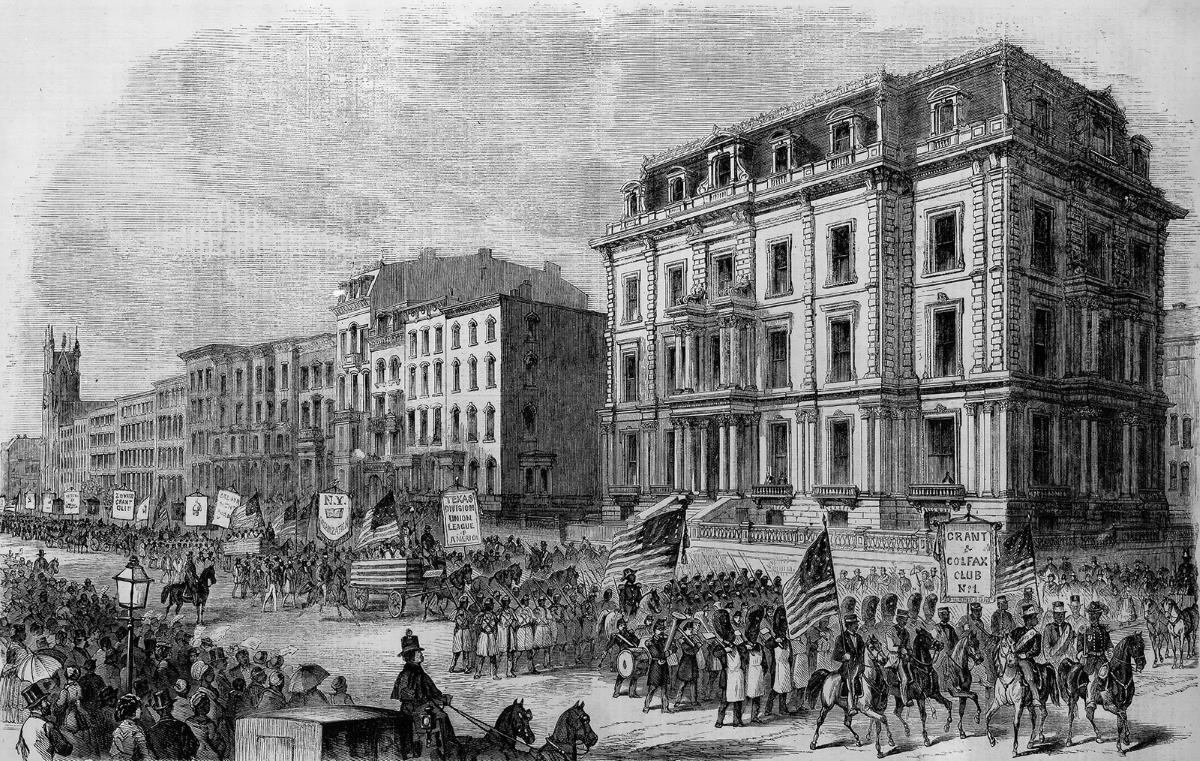
Blacks marching in support of the 15th Amendment
guaranteeing the right to vote despite race, color or previous servitude (i.e., slavery)
(passed in Congress in February of 1869 – ratified a year later)
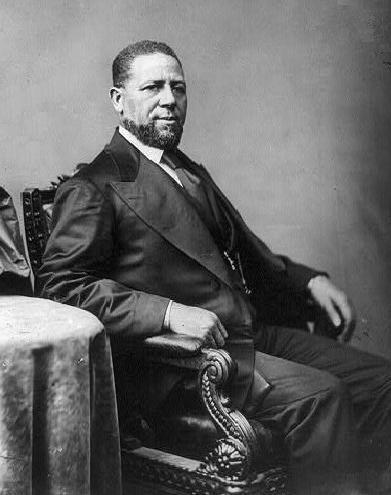
(appointed to serve a 1-year unexpired term in the Senate)
- 1870
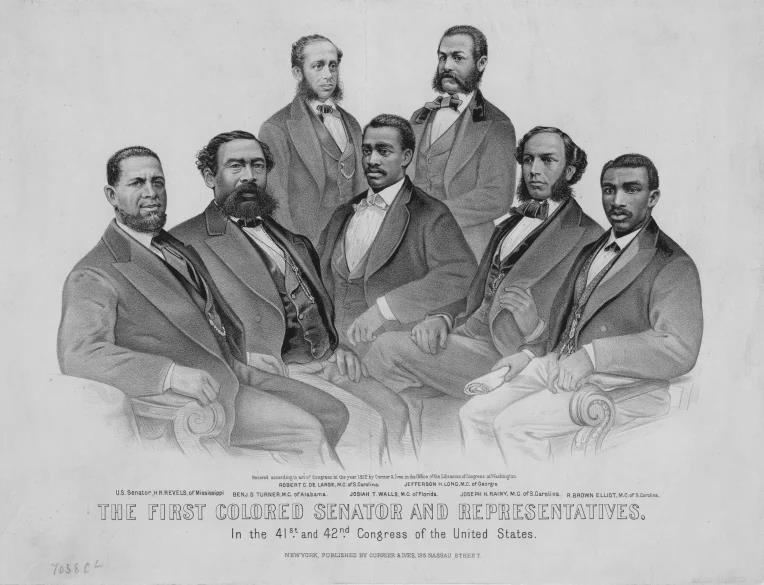
Serving 1869 to 1873
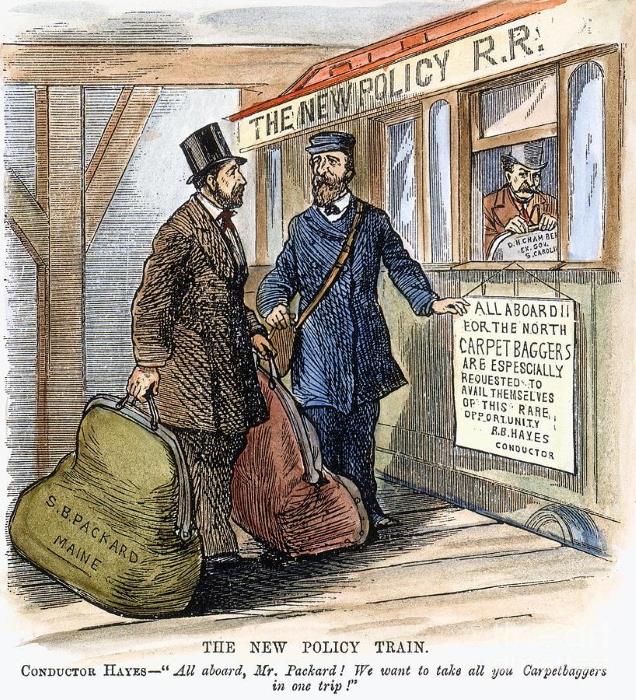
To gain the presidency in 1876, Hayes agreed to recall all Federal "Carpetbaggers"
from the South. This ended North-directed Reconstruction.
The South was on its own now.


 Miles
H. Hodges
Miles
H. Hodges